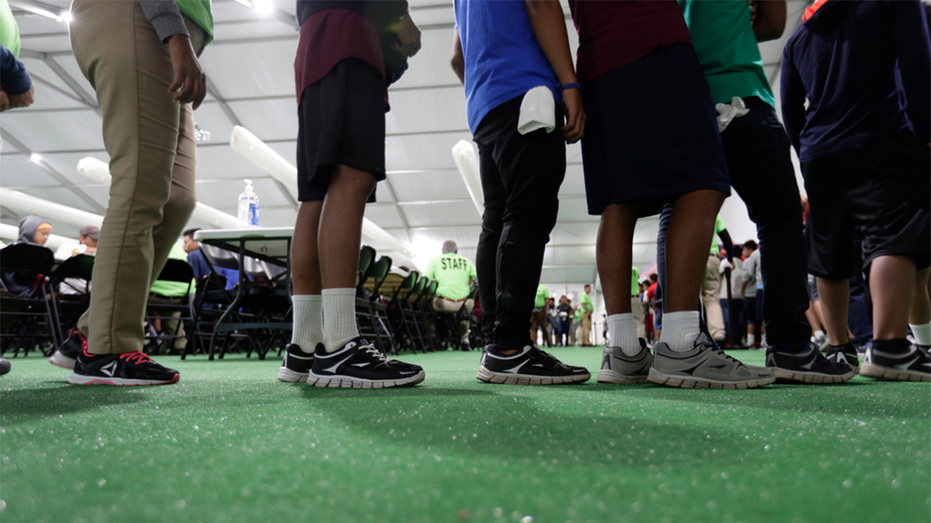A federal judge appointed by President Joe Biden has issued a significant ruling that halts the Trump administration’s efforts to eliminate legal aid for unaccompanied migrant children. This ruling marks a crucial step in the ongoing debate surrounding immigration policy and the treatment of vulnerable populations in the United States.
The decision, which stems from a case brought by several advocacy groups, underscores the importance of providing legal resources to unaccompanied minors who are navigating the complex immigration system. The judge’s ruling argues that access to legal assistance is vital for these children, as they often face difficult challenges when trying to secure their rights and protections under U.S. law.
The Trump administration’s attempts to cut funding for legal services aimed at unaccompanied children were met with fierce criticism from immigration advocates, who argued that such actions would leave vulnerable minors without the necessary support to navigate a system that can be daunting and complicated. Legal aid is crucial for ensuring that these children have the means to present their cases adequately and access the protections they are entitled to.
In her ruling, the judge emphasized the potential harm to unaccompanied minors that could arise from a lack of legal representation. The ruling highlights the broader implications of denying legal aid, noting that many of these children are fleeing violence, persecution, and other life-threatening situations in their home countries. By cutting off legal aid, the legal system would be failing to protect their rights and interests.
The case that led to this judicial intervention was a culmination of efforts by multiple organizations that advocate for the rights of immigrant children. These groups have rallied around the importance of ensuring that unaccompanied minors have access to legal representation, particularly as the immigration landscape continues to evolve and policies shift dramatically from one administration to another.
Advocates hailed the ruling as a victory not only for unaccompanied minors but also for the principle of due process in the immigration system. They emphasized that every child deserves the right to legal support, particularly when their futures hang in the balance. The judge’s ruling reinforces this essential right and ensures that children’s voices are heard in immigration proceedings.
Throughout the past several years, the plight of unaccompanied minors has garnered significant media attention, particularly in light of the increasing number of children arriving at the U.S.-Mexico border. These children often make perilous journeys alone, fleeing violence, poverty, and instability in their home countries. When they reach the U.S., many face complex legal proceedings regarding their immigration status, making access to legal representation even more crucial.
The Trump administration’s attempts to terminate legal assistance programs stemmed from a broader effort to tighten immigration policies and limit the flow of migrants to the United States. However, this approach has been met with robust resistance from human rights advocates, legal experts, and child welfare organizations. They argue that rather than eliminating support, the focus should instead be on strengthening protections for vulnerable populations.
While the Biden administration has reversed many of the previous administration’s hardline immigration policies, the legal battles surrounding the treatment of unaccompanied minors continue to unfold. This ruling by the Biden-appointed judge is seen as part of a larger trend to protect and uphold the rights of individuals seeking asylum and refuge in the United States.
The implications of this ruling extend beyond the immediate scope of legal aid for unaccompanied children. Advocates argue that when children are adequately represented, the U.S. justice system can better serve its purpose of delivering fair and just outcomes. Coupled with the rising numbers of unaccompanied minors seeking refuge, this ruling signals a significant moment in the ongoing conversation about immigration policy and child welfare.
It is crucial to recognize that the legal battles over immigration policy are not solely about resources; they are fundamentally about the lives and futures of children. Each child seeking refuge in the United States carries their own story of hardship and resilience, and the legal system must be prepared to listen to those stories. The judge’s recent decision reiterates that prioritizing legal support for these minors aligns with the nation’s commitment to justice and humane treatment.
Advocacy groups are expected to continue pushing for policies that support legal representation for vulnerable populations, believing that access to justice is a fundamental right. The ruling provides a hopeful precedent, demonstrating that the judiciary can serve as a check against arbitrary policy changes that could harm the most vulnerable.
As discussions surrounding immigration persist, various stakeholders involved in the process remain vigilant. They emphasize the need for comprehensive reform that addresses the root causes of migration while ensuring protections are in place for individuals and, particularly, children seeking refuge in the United States. Legal aid, as established through this ruling, is a piece of that puzzle, ensuring that unaccompanied minors can navigate an often unforgiving system.
The ruling also reflects the growing awareness and acknowledgment of the complexities surrounding immigration, particularly in the context of unaccompanied minors. Policymakers are being urged to prioritize child welfare in immigration discussions, ensuring that the interests of vulnerable children are not lost in the larger political discourse.
In summary, the ruling by the Biden-appointed judge indicates a clear commitment to upholding the rights of unaccompanied migrant children and ensuring they can access the legal protections available to them. This decision is a significant step in the ongoing struggle for justice within the immigration system and reinforces the need for comprehensive approaches to address the challenges faced by unaccompanied minors entering the United States. As the legal landscape continues to evolve, the commitment to protecting the rights of immigrant children remains a critical priority and a testament to the nation’s values of justice, dignity, and humanity.
































